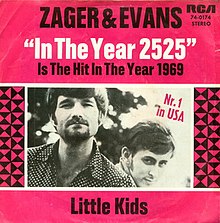2525
| "In the Year 2525" | ||||
|---|---|---|---|---|

German single cover
|
||||
| Single by Zager and Evans | ||||
| from the album 2525 (Exordium & Terminus) | ||||
| B-side | "Little Kids" | |||
| Released | 1968 (on Truth label) | |||
| Format | 7" | |||
| Recorded | 1968 | |||
| Genre | Folk rock | |||
| Length |
3:10 (Truth label) 3:15 (RCA label) |
|||
| Label | Truth; RCA | |||
| Writer(s) | Rick Evans | |||
| Producer(s) | Zager and Evans | |||
| Zager and Evans singles chronology | ||||
|
||||
3:10 (Truth label)
"In the Year 2525" is a 1969 hit song by the American pop-rock duo of Zager and Evans. It reached number one on the Billboard Hot 100 for six weeks commencing July 12, 1969. It peaked at number one in the UK Singles Chart for three weeks in August and September that year. The song was written and composed by Rick Evans in 1964 and originally released on a small regional record label (Truth Records) in 1968. Zager and Evans disbanded in 1971.
It is unusual for a recording artist to have a number one hit and then never have another chart single. Zager and Evans are the only act to do this in both the U.S. Billboard Hot 100 and the UK Singles Chart. Their follow-up single on RCA-Victor, "Mr. Turnkey" (a song about a rapist who nails his own wrist to the wall as punishment for his crime), failed to hit the main music charts on either side of the Atlantic Ocean. Another single, "Listen to the People", managed to make the bottom slot of the Cashbox chart at #100.
"In the Year 2525 ( & )" opens with the words:
Subsequent verses pick up the story at 1010-year intervals from 2525 to 6565. Disturbing predictions are given for each selected year. In the year 3535, for example, all of a person's actions, words and thoughts will be preprogrammed into a daily pill. Then the pattern as well as the music changes, going up a half step in the key of the song, after two stanzas, first from A-flat minor, to A minor, and, then, finally, to B flat minor, and verses for the years 7510, 8510 and 9595 follow.
The song has no chorus. The summary verse concludes:
The song goes back to the beginning, starting all over again, with 2525 before the song's fade.
The overriding theme, of a world doomed by its passive acquiescence to and overdependence on its own overdone technologies, struck a resonant chord in millions of people around the world in the late 1960s.
The song was recorded primarily in one take in 1968, at a studio in a cow pasture in Odessa, Texas. Members of the Odessa Symphony also participated in the recording.
...
Wikipedia
